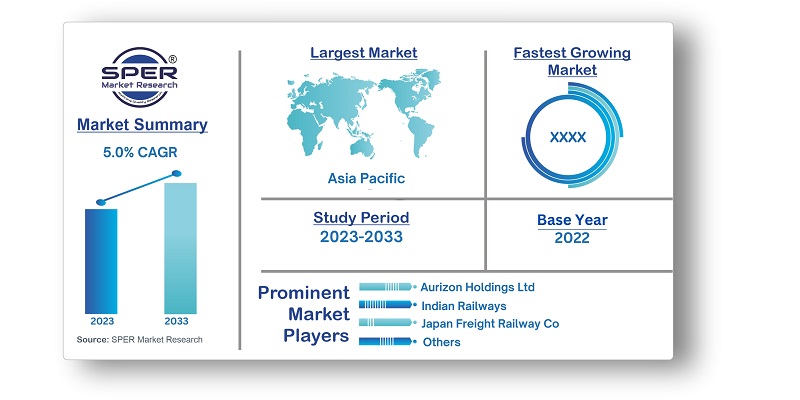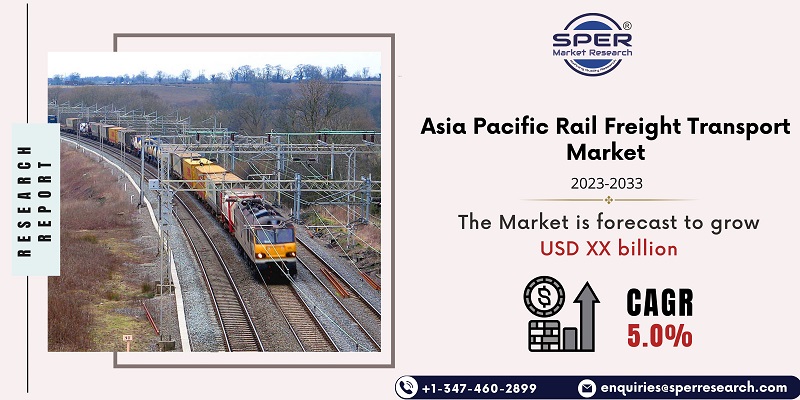
Asia Pacific Rail Freight Transport Market Growth, Size, Trends, Revenue, Share and Future Outlook
Asia Pacific Rail Freight Transport Market Size- By Cargo Type, By Destination, By Service Type- Regional Outlook, Competitive Strategies and Segment Forecast to 2033
| Published: Jan-2024 | Report ID: AMIN2439 | Pages: 1 - 154 | Formats*: |
| Category : Automotive & Transportation | |||
- September 2022 - KiwiRail has signed a supply contract with French multinational Alstom, backed up by a fifteen-year maintenance contract, for a once-in-a-generation upgrade to its Train Control System. The Train Control team oversees the movement of freight, commuter, and scenic trains throughout New Zealand, and this new computer control system will improve automation, resilience, and safety across the entire rail network.
- July 2022: On July 29, 2022, Aurizon successfully paid USD 2.35 billion to acquire One Rail Australia (ORA). In addition to providing scope and scale with new customers, new regions, and increased exposure to emerging economy commodities like copper, manganese, and rare earth, the acquisition is revolutionary for Aurizon and consistent with our growth strategy.


| Report Metric | Details |
| Market size available for years | 2019-2033 |
| Base year considered | 2022 |
| Forecast period | 2023-2033 |
| Segments covered | By Cargo Type, By Destination, By Service Type |
| Regions covered | Eastern Region, Western Region, Southern Region, Northern Region |
| Companies Covered | Aurizon Holdings Ltd., China State Railway Group Co. Ltd., Indian Railways, Japan Freight Railway Co., KiwiRail Ltd., M & W China Limited, OBB-Holding AG, Pacific National Group, PT Kereta Api Indonesia, Qube Holdings Ltd., Others |
- Railway Companies and Operators
- Manufacturers and Shippers
- Technology and Solution Providers
- Logistics and Supply Chain Managers
| By Cargo Type: | Containerized Non-Containerized Liquid Bulk |
| By Destination: | Domestic International |
| By Service Type: |
|
| By Region: |
|
- Asia Pacific Rail Freight Transport Market Size (FY’2023-FY’2033)
- Overview of Asia Pacific Rail Freight Transport Market
- Segmentation of Asia Pacific Rail Freight Transport Market By Cargo Type (Containerized, Non-Containerized, Liquid Bulk)
- Segmentation of Asia Pacific Rail Freight Transport Market By Destination (Domestic, International)
- Segmentation of Asia Pacific Rail Freight Transport Market By Service Type (Transportation, Services allied to transportation )
- Expansion Analysis of Asia Pacific Rail Freight Transport Market
- Problems and Obstacles in Asia Pacific Rail Freight Transport Market
- Competitive Landscape in the Asia Pacific Rail Freight Transport Market
- Impact of COVID-19 and Demonetization on Asia Pacific Rail Freight Transport Market
- Details on Current Investment in Asia Pacific Rail Freight Transport Market
- Competitive Analysis of Asia Pacific Rail Freight Transport Market
- Prominent Players in the Asia Pacific Rail Freight Transport Market
- SWOT Analysis of Asia Pacific Rail Freight Transport Market
1.1. Scope of the report1.2. Market segment analysis
2.1. Research data source2.1.1. Secondary Data2.1.2. Primary Data2.1.3. SPER’s internal database2.1.4. Premium insight from KOL’s2.2. Market size estimation2.2.1. Top-down and Bottom-up approach2.3. Data triangulation
4.1. Driver, Restraint, Opportunity and Challenges analysis4.1.1. Drivers4.1.2. Restraints4.1.3. Opportunities4.1.4. Challenges4.2. COVID-19 Impacts of the Asia Pacific Rail Freight Transport Market
5.1. SWOT Analysis5.1.1. Strengths5.1.2. Weaknesses5.1.3. Opportunities5.1.4. Threats5.2. PESTEL Analysis5.2.1. Political Landscape5.2.2. Economic Landscape5.2.3. Social Landscape5.2.4. Technological Landscape5.2.5. Environmental Landscape5.2.6. Legal Landscape5.3. PORTER’s Five Forces5.3.1. Bargaining power of suppliers5.3.2. Bargaining power of buyers5.3.3. Threat of Substitute5.3.4. Threat of new entrant5.3.5. Competitive rivalry5.4. Heat Map Analysis
6.1. Asia Pacific Rail Freight Transport Market Manufacturing Base Distribution, Sales Area, Product Type6.2. Mergers & Acquisitions, Partnerships, Product Launch, and Collaboration in Asia Pacific Rail Freight Transport Market
7.1. Asia Pacific Rail Freight Transport Market Value Share and Forecast, By Cargo Type, 2023-20337.2. Containerized7.3. Non-Containerized7.4. Liquid Bulk
8.1. Asia Pacific Rail Freight Transport Market Value Share and Forecast, By Destination, 2023-20338.2. Domestic8.3. International
9.1. Asia Pacific Rail Freight Transport Market Value Share and Forecast, By Service Type 2023-20339.2. Transportation9.3. Services allied to transportation
10.1. Asia Pacific Rail Freight Transport Market Size and Market Share
11.1. Asia Pacific Rail Freight Transport Market Size and Market Share By Cargo Type (2019-2026)11.2. Asia Pacific Rail Freight Transport Market Size and Market Share By Cargo Type (2027-2033)
12.1. Asia Pacific Rail Freight Transport Market Size and Market Share By Destination (2019-2026)12.2. Asia Pacific Rail Freight Transport Market Size and Market Share By Destination (2027-2033)
13.1. Asia Pacific Rail Freight Transport Market Size and Market Share By Service Type (2019-2026)13.2. Asia Pacific Rail Freight Transport Market Size and Market Share By Service Type (2027-2033)
14.1. Asia Pacific Rail Freight Transport Market Size and Market Share By Region (2019-2026)14.2. Asia Pacific Rail Freight Transport Market Size and Market Share By Region (2027-2033)14.3. Eastern Region14.4. Western Region14.5. Southern Region14.6. Northern Region
15.1. Aurizon Holdings Ltd.15.1.1. Company details15.1.2. Financial outlook15.1.3. Product summary15.1.4. Recent developments15.2. China State Railway Group Co. Ltd.15.2.1. Company details15.2.2. Financial outlook15.2.3. Product summary15.2.4. Recent developments15.3. Indian Railways15.3.1. Company details15.3.2. Financial outlook15.3.3. Product summary15.3.4. Recent developments15.4. Japan Freight Railway Co.15.4.1. Company details15.4.2. Financial outlook15.4.3. Product summary15.4.4. Recent developments15.5. KiwiRail Ltd.15.5.1. Company details15.5.2. Financial outlook15.5.3. Product summary15.5.4. Recent developments15.6. M & W China Limited15.6.1. Company details15.6.2. Financial outlook15.6.3. Product summary15.6.4. Recent developments15.7. OBB-Holding AG15.7.1. Company details15.7.2. Financial outlook15.7.3. Product summary15.7.4. Recent developments15.8. Pacific National Group15.8.1. Company details15.8.2. Financial outlook15.8.3. Product summary15.8.4. Recent developments15.9. PT Kereta Api Indonesia15.9.1. Company details15.9.2. Financial outlook15.9.3. Product summary15.9.4. Recent developments15.10. Qube Holdings Ltd.15.10.1. Company details15.10.2. Financial outlook15.10.3. Product summary15.10.4. Recent developments15.11. Others
SPER Market Research’s methodology uses great emphasis on primary research to ensure that the market intelligence insights are up to date, reliable and accurate. Primary interviews are done with players involved in each phase of a supply chain to analyze the market forecasting. The secondary research method is used to help you fully understand how the future markets and the spending patterns look likes.
The report is based on in-depth qualitative and quantitative analysis of the Product Market. The quantitative analysis involves the application of various projection and sampling techniques. The qualitative analysis involves primary interviews, surveys, and vendor briefings. The data gathered as a result of these processes are validated through experts opinion. Our research methodology entails an ideal mixture of primary and secondary initiatives.



Frequently Asked Questions About This Report
PLACE AN ORDER
Year End Discount
Sample Report
Pre-Purchase Inquiry
NEED CUSTOMIZATION?
Request CustomizationCALL OR EMAIL US
100% Secure Payment






Related Reports
Our Global Clients
Our data-driven insights have influenced the strategy of 200+ reputed companies across the globe.




















